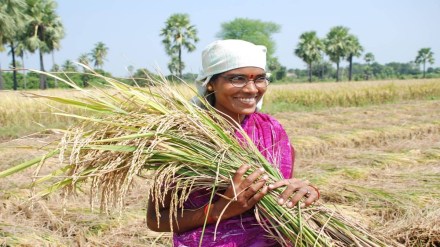By Ravinder Grover
The recently published “State of Food Security and Nutrition in the World” (SOFI) 2024 report revealed a grim picture of the global hunger crisis, underscoring the dire need for immediate and coordinated action. The report, jointly released by key UN agencies, highlights that approximately 733 million people experienced hunger in 2023, a situation largely unchanged from previous years due to persistent global crises.
Key Findings and Challenges:
The SOFI 2024 report reveals several critical statistics:
- Undernourishment: Between 713 million and 757 million people were undernourished in 2023, reflecting a significant increase from 2019 levels.
- Food Insecurity: Approximately 2.33 billion people experienced moderate or severe food insecurity in 2023, with the highest numbers in Africa.
- Cost of Healthy Diets: Around 2.8 billion people cannot afford a healthy diet, highlighting the urgent need for economic reforms and support.
The report identifies conflict, climate change, and economic downturns as primary drivers exacerbating food insecurity and malnutrition. These factors, combined with food price inflation and persistent inequalities, are undermining global efforts to eradicate hunger by 2030.
The Double Burden of Malnutrition
A notable concern in the report is the double burden of malnutrition, where undernutrition coexists with rising obesity rates. While thinness and underweight have declined, obesity has surged globally, with projections indicating that over 1.2 billion adults will be obese by 2030. This dual challenge complicates efforts to improve global health and nutritional outcomes.
Financing and Innovative Solutions
The theme of this year’s report, “Financing to End Hunger, Food Insecurity and All Forms of Malnutrition,” emphasizes the critical need for increased and more effective financial investments. It calls for transforming agrifood systems, addressing inequalities, and ensuring affordable, accessible healthy diets for all. The report stresses that bridging the financing gap is essential for achieving Sustainable Development Goal 2 (Zero Hunger).
Promoting Biofortification
In addressing the critical issue of malnutrition, the promotion of biofortification stands out as a pivotal strategy. Biofortification involves the improvement of food crops to increase their nutritional value, enhancing the content of essential vitamins and minerals such as iron, zinc, and vitamin A. This approach is particularly vital in regions where traditional diets lack these micronutrients, leading to widespread deficiencies and related health issues.
Biofortified crops such as iron-rich beans, zinc enriched wheat, and vitamin A enriched sweet potatoes and maize have shown significant promise in combating hidden hunger. Integrating biofortification into agrifood systems can enhance the nutritional quality of staple foods, directly benefiting vulnerable populations and reducing the prevalence of micronutrient deficiencies.
Regional Insights and Gender Disparities
The report also highlights regional disparities and the persistent gender gap in food security. Women, especially in low-income and rural areas, face greater challenges in accessing nutritious food due to economic and societal inequalities. Addressing these gender-specific issues is crucial for developing effective strategies to combat hunger and malnutrition.
Calls to Action
Leaders of the five UN agencies involved in the report have called for urgent, coordinated action to address the global hunger crisis. FAO Director General Qu Dongyu emphasized the importance of transforming agrifood systems to build resilience against future challenges. Similarly, IFAD President Alvaro Lario and UNICEF Executive Director Catherine Russell underscored the need for smart investments and urgent financing to end child malnutrition and support sustainable development.
In summary, the SOFI 2024 report presents a stark reminder of the ongoing global hunger crisis and the complex challenges of malnutrition. It calls for immediate, innovative, and coordinated efforts from governments, civil society, and the private sector to ensure a future free from hunger. The promotion of biofortification, alongside other transformative approaches, is crucial in making significant strides towards achieving Zero Hunger. The time to act is now, as the world cannot afford to delay solutions to this pressing humanitarian issue.
(The author is the Global Business Manager, HarvestPlus Solutions. Views are personal)
